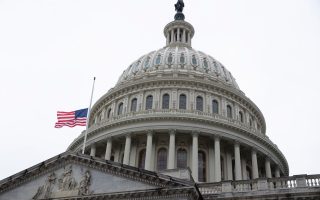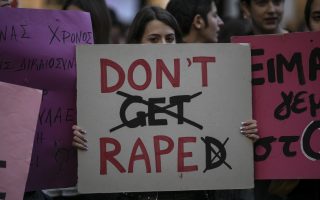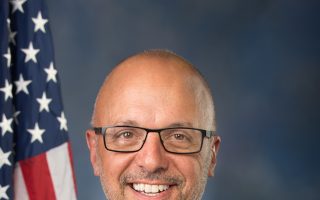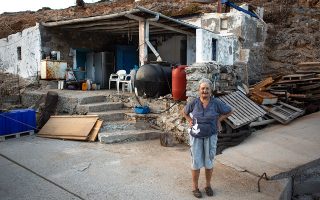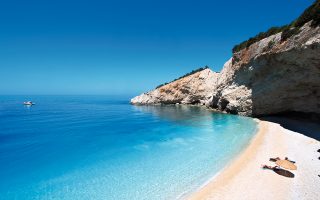‘It is like opening a wound again,’ say parents of murdered American youth
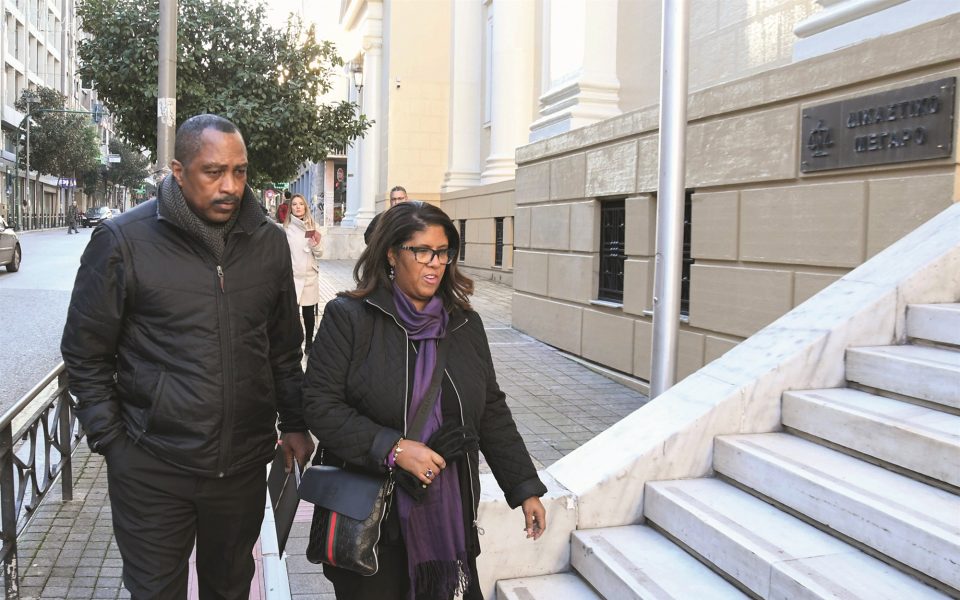
Jill and Phil Henderson traveled to Greece’s western port city of Patra late last month. It was their fifth trip there and even though they were warmly received at their usual hotel and taverna, they knew they were in for a very tough time. There was only one reason they were there: the retrial for the murder of their son Bakari in the summer of 2017 on the Ionian holiday island of Zakynthos.
“It is like opening a wound again. It’s just like we keep opening it and it’s just getting bigger,” Jill tells Kathimerini.
Sleepless and anxious, they took their seats in the local court of appeals on February 21. “It was stressful because we were not expecting any of the defendants, but seeing them again made it hard,” they say. Today, five years after Bakari, 22, was attacked and killed, just one of the nine defendants is behind bars. As soon as the session started, one of their lawyers asked for a adjournment. The judge agreed and the hearing was put off until February 23.
Jill vividly remembers how in 2018, after the first court hearing, she tried to get a clear answer about when the process would start and how long it would take, but was unable to understand what the family’s lawyer was saying. “I kept asking him what the court dates were so that we could plan. He kept telling me, ‘The first day we will open our calendars and we will figure it out,’ and I kept thinking, ‘Can’t everybody look at their calendar now?’”
When the trial started in September 2018, two key witnesses – friends of the Texan college graduate – lost heart when the hearing was postponed because of scheduling clashes with some of the defendants’ lawyers. The bench agreed to the continuance even though it would mean that the witnesses would have to cancel their return tickets to the US to testify. Today they are still waiting for a definitive date so they can see whether they will make it for the retrial. “It’s hard because they are working and trying to make ends meet. I know it’s important for the case, but we didn’t want to make them feel pressured to come, especially when we are here not knowing what will happen,” explains Jill.
The entire situation was confounding to the Americans, not least because of the bureaucracy, which included having to submit proof during the first hearing that they were, in fact, Bakari’s parents.
“The certificates we have in America are different than the Greek ones, so they told us they were inadmissible. It took a long time to sort it out,” says Jill.
‘We didn’t know at all, we had no idea. We were not sure how that came about. We were very pleasantly surprised,’ the couple says about the interest expressed by Kamala Harris
The first time they faced such an incident, it left them feeling emotionally drained. When a similar delay arose this time, they just sat there quietly waiting for it to be resolved. The Hendersons have developed an armor against the reality of Greece over the past five years. It helps that they have been in touch with other families who have faced a similarly painful process after losing loved ones here, like those of Australian tourist Doujon Zammit, who was killed on Mykonos in 2008, and US biologist Suzanne Eaton, murdered on Crete in 2019.
Shortly before the trail began into Eaton’s murder, Jill had sent a letter to her family: “As you prepare to sit through the trial of your beloved Suzanne Eaton, the language will be foreign, your faces will be displayed in the media daily, the proceedings will play out like a movie scene and may even be delayed. You may feel isolated during the passionate exchanges between the attorneys, which are very different from court proceedings in the US, and justice may ultimately not look like what you would expect,” she warned.
Unexpected support
During their most recent trip to Greece, the Hendersons have been joined by their two surviving children and three other relatives. They know that they don’t have to be at every single hearing – and without a translator they understand very little of what’s being said – but they feel it’s important that they are: “For the bench, for the defendants and for their lawyers. We have to remind them that there is an entire family and friends who have been left behind, suffering,” they tell Kathimerini.
When they walked out of the courtroom on February 21, their disappointment was palpable. Perhaps that is why they had trouble believing that US Vice President Kamala Harris brought up the Bakari Henderson murder trial during a recent meeting with Greek Prime Minister Kyriakos Mitsotakis on the sidelines of a security conference in Munich. “We didn’t know at all, we had no idea. We were not sure how that came about. We were very pleasantly surprised,” says Jill. Later at the hotel, they tried to figure out where this unlikely support had come from. Maybe it was thanks to the Greek-American community or the American Embassy in Athens, which always sends a member of the consular staff to every hearing to offer support where needed.
But speaking with people back home in the US, it became more likely that it was the result of an interview given by the family to famed American television presenter Gayle King, who for five years has worn a purple bracelet in Bakari’s memory. “Say his name,” she said in a heartfelt appeal to the Greek authorities that the young Black man not be forgotten.
Reactions
According to sources, Mitsotakis assured Harris that he would take a personal interest in the case and keep her informed of developments, a fact that prompted reactions from the defendants’ lawyers. Alexis Kougias, the celebrity lawyer who is defending three of the nine suspects, issued a statement to the press saying, “Have we become some American outpost where even independent Greek justice will ultimately act in ways dictated by the US?”
This was not the first time since the start of the first trial that the defense had sought to insinuate pressure is being exerted from the American side. One such complaint prompted the prosecutor to accuse the lawyer in question of “talking nonsense,” and he snapped back, “If there is one side putting pressure it is not the Americans but the Serbs, who keep sending us letters accusing us of not doing our jobs properly.” Five of the nine defendants are Serbian nationals.
The admonishment did little to stop them. In fact, when the defendants were acquitted of murder and found guilty of assault instead in the first trial, one of their lawyers congratulated the judges for “not giving in to the Americans.”
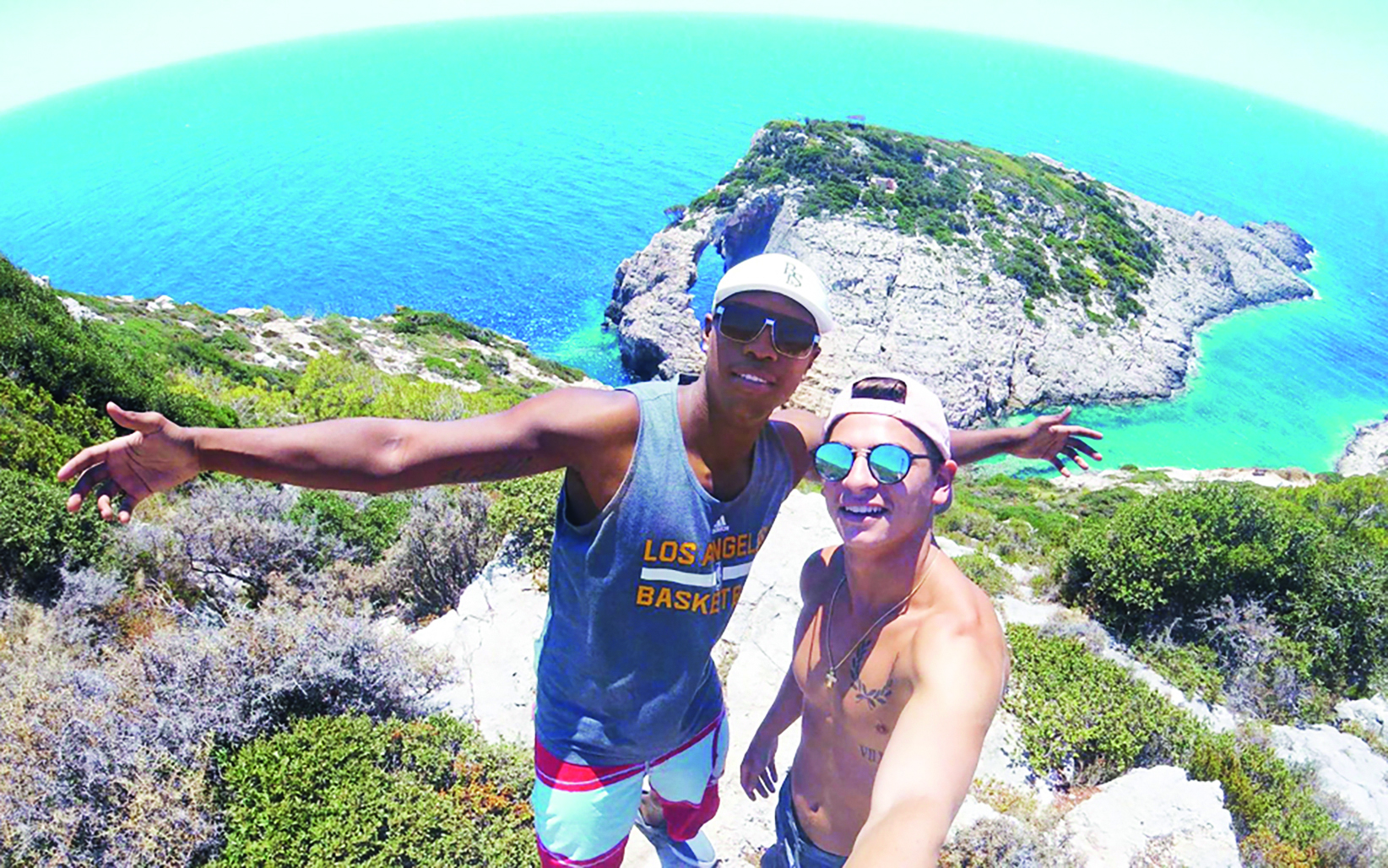
In 2018, the judges at the Patra mixed court effectively upheld the claim of the defendants that they had not intended to kill Bakari when they attacked him outside a bar and that his death was an accident. The decision and all that took place in the court that day was incredibly traumatic for the Hendersons, who were trying to understand what the judges had said as the defendants celebrated the verdict, hugging their lawyers and family members.
As one of the defense lawyers had admitted to Kathimerini at the time, even they were surprised by the verdict. “It was an unfair decision that sends a message to everyone traveling to Greece: If someone can be murdered and there’s no punishment, what makes you think that your child is safe here?” Jill had told Kathimerini at the time. Both she and her husband believe that their son’s murder was racially motivated.
Just a few hours before the court’s final decision was announced, they had learned that the prosecutor was planning to appeal, which is something that happened – unusually – the very next morning. The demand for a retrial was accepted by the appeals prosecutor and the new hearing was scheduled for early 2020. The Hendersons came back to Greece, but the hearing was postponed. Two more dates in 2021 were also missed because of the pandemic.
A few hours before the February 23 session, Jill felt optimistic. They had booked return tickets for March 2 in the hope that things would go faster this time around and they wouldn’t need to fly back for the verdict. Phil testified that morning, but the trial was then stopped and adjourned again, this time until March 11.
The attack
The last time Jill and Phil spoke with their son was the day before he was killed. Bakari had called to wish Phil a happy birthday. After they hung up, he sent them a video from Zakynthos’ iconic Navagio beach, where he was seen playing football and laughing. They were so proud of him. He had just graduated from college and was happily embarking on the next chapter of his life.
The 22-year-old and his friends had been planning the trip to Greece for months. The four young men, who became friends at college, had decided to travel to Europe and made Zakynthos their first stop because one of them hailed from the popular holiday island. Bakari had brought along some clothing that he had designed and they spent the first day scouting cool locations to photograph them for his portfolio.
The fight started in a bar in the seaside resort of Laganas, when Bakari and two of his friends struck up a conversation with a 20-year-old Serbian woman. At some point, a compatriot of hers stepped in, obviously annoyed, and asked her why she was speaking to “the Black guy” when the bar was full of Serbs. She ignored him and kept speaking to the young Americans, also shooting a selfie video. At one point, the man who had admonished her threw a glass of water at her. Bakari said something in her defense and got punched in the face. He did not react for a few second but then grabbed a bottle of beer, smashed it over the Serb’s head and punched him twice. The bar’s bouncer, also a Serb, and a few other men rushed to the scene of the fracas. As Bakari tried to get away, he is said to have thrown an ashtray at them.
According to the case file, the bouncer then appears to have asked the bar’s Greek owner for a set of brass knuckles and Bakari was cornered by one of the Greek defendants on the street some 30 meters away, as more men streamed out of the bar. Some of those men didn’t even know how the fight had started, but they weighed in anyway, hitting and kicking the young American. It was a vicious assault – yet no one called the police. By the time an ambulance came, it was too late. Bakari was dead.
The autopsy
All nine defendants practically denied hitting Bakari. Even though their actions had been caught on camera, almost all brought in a medical expert or technical adviser to claim that it was not their client that dealt the fatal blow, but someone else.
The medical examiner appointed by the state found compelling evidence to suggest that Bakari had been struck 33 times and that all of them caused his death.
